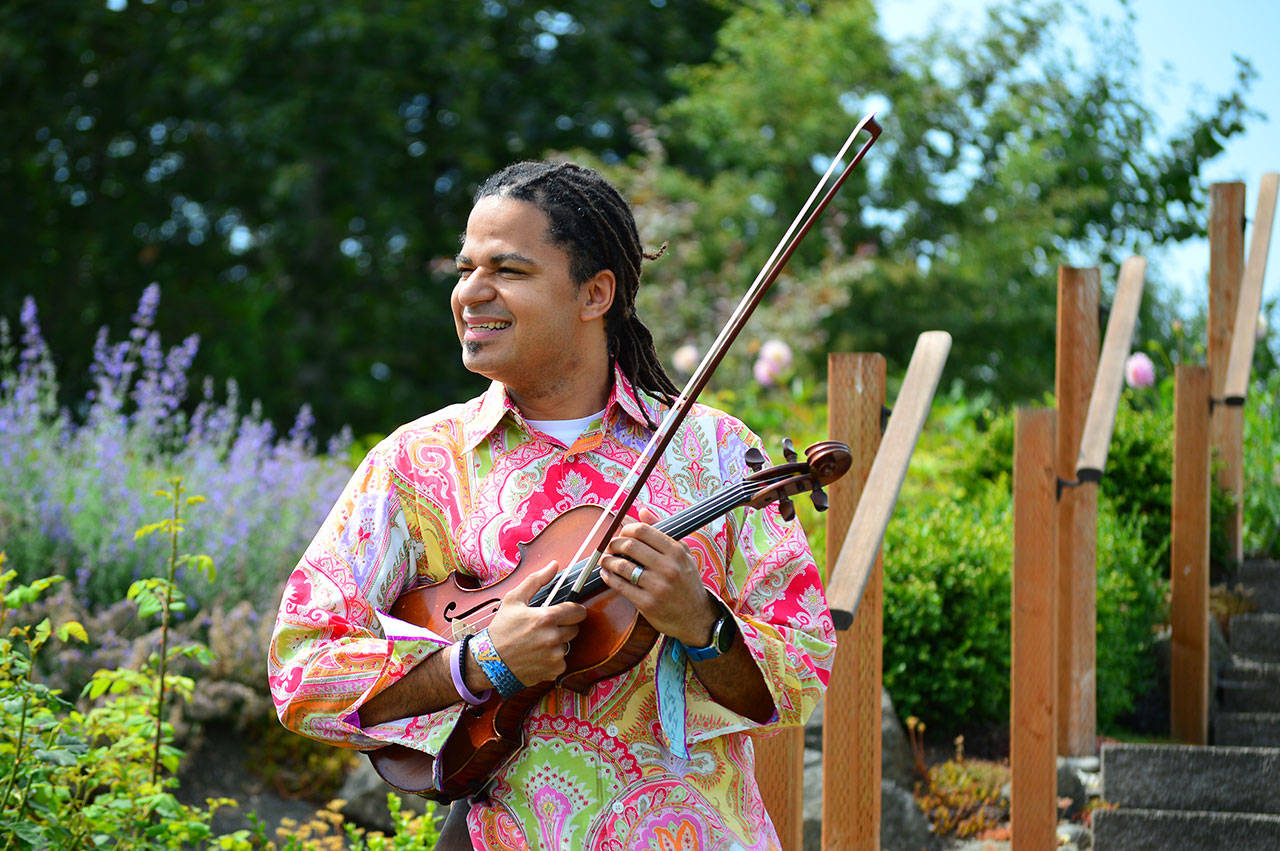This is, in a word, “fantastic,” said Sequim musician Kate Southard-Dean.
The veteran violinist is referring to her recent reunion with her fellow Port Angeles Symphony players. They’re preparing for their first concert in eight months: a performance of two works chosen for the occasion, Johannes Brahms’ Double Concerto and Felix Mendelssohn’s Octet, to be offered to the public online and free during the week of Nov. 9.
”This music is really exciting,” added concertmaster Jory Noble, who joined the orchestra this year after performing with ensembles all over North America. She and Southard-Dean will play in concert with violist Tyrone T. Beatty of Sequim, cellists Traci Winters Tyson and Karson Nicpon of Port Angeles, violinist Marina Rosenquist of Port Townsend and James Garlick, who is back in his home town of Port Angeles for this event.
Sequim Community Orchestra director Phil Morgan-Ellis, a violist, also joins the ensemble. The Port Angeles Symphony is the only local orchestra presenting concerts this fall, as Sequim’s and Port Townsend’s orchestras have postponed theirs until next year.
Jonathan Pasternack, the Symphony’s music director and conductor, leads rehearsals at Holy Trinity Lutheran Church, which he said is extremely careful with its safety protocols. The musicians are the first outside group to use the space since the pandemic began.
When they walked into the church sanctuary in early October, it was the first time the musicians had gotten together since last Feb. 22. That was the night when the full orchestra, with guest artist Josu De Solaun, gave their winter concert in the Port Angeles High School Performing Arts Center. Pasternack, for his part, hasn’t had a pause like this at any point since starting his conducting career some 40 years ago.
Rehearsing these past weeks hasn’t been easy, Southard-Dean said. Masks are something each performer must get used to, and with the ensemble members spaced 6 feet or more from one another, they’ve got to watch more intently than ever — for eye contact, body language, the subtlest musical nuance.
“All that said, everybody is very inspired by the music and by being together,” Pasternack added.
“It’s a very emotional time for all of us.”
Pasternack has tailored the Brahms concerto for this tighter group of string players, which for the final rehearsal and concert video recording will feature two guest soloists: Charlotte and Olivia Marckx, who are known as the Sempre Sisters. Violinist Charlotte Marckx debuted with the Port Angeles Symphony in December 2018; her older sister Olivia, a cellist, will give her first performance here. The Seattle-area duo is known for their award-winning “Bach to Beatles” music, which they’ve played in recitals, at the Northwest Folklife Festival and on National Public Radio.
Violist Beatty relishes this chance to play the Brahms alongside the Sempre Sisters. He’s also looking forward to revisiting Mendelssohn’s Octet, which he performed some 14 years ago with The Young Eight, an ensemble of African-American classical musicians known around the country.
For Beatty, rehearsing both works now is a new adventure.
“We’re on heightened alert,” he said. “Since we’re spread out, we really have to listen. It adds to the intensity.”
A video crew will record the ensemble’s performance on Nov. 7, and the one-hour production will be available to view during the following week on YouTube, with links provided on Portangelessymphony.org, on the Port Angeles Symphony Facebook page and via email to those wanting to tune in.
“When you’re engaged with others in music-making, you get immediate inspiration. You miss it. You ache for it,” said violinist Rosenquist. Like her compatriots, she believes in giving her all, regardless of audience size or location.
Meantime, cellist Nicpon, who will be seated across the room from Rosenquist, hopes people watching at home will receive the same solace he does when immersed in Mendelssohn and Brahms.
A first-year student at the University of Washington, Nicpon is taking all his courses online, at home in Port Angeles; he gave an interview right after his evening chemistry lab.
Set aside time to enjoy the performance without distractions, Nicpon advised.
“The Brahms is very grand,” he said, adding, “I love it.”
Rosenquist feels as strongly about the Mendelssohn Octet, which she first heard as a teenager at the Oberlin Conservatory music camp in Ohio.
“I was enthralled at how beautiful it is,” she recalled.
“It was so uplifting then. And that carries through to now.”



